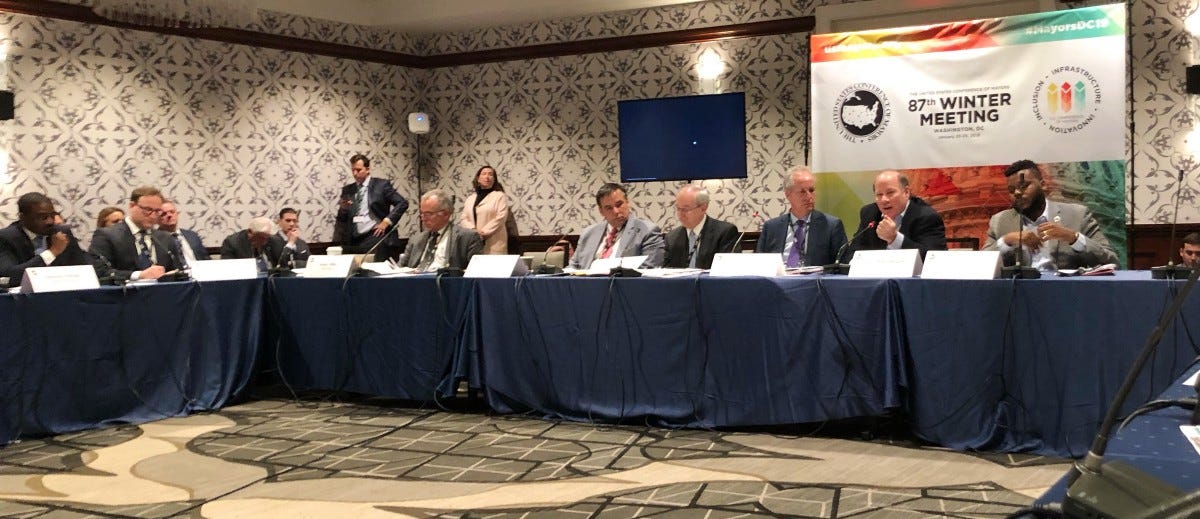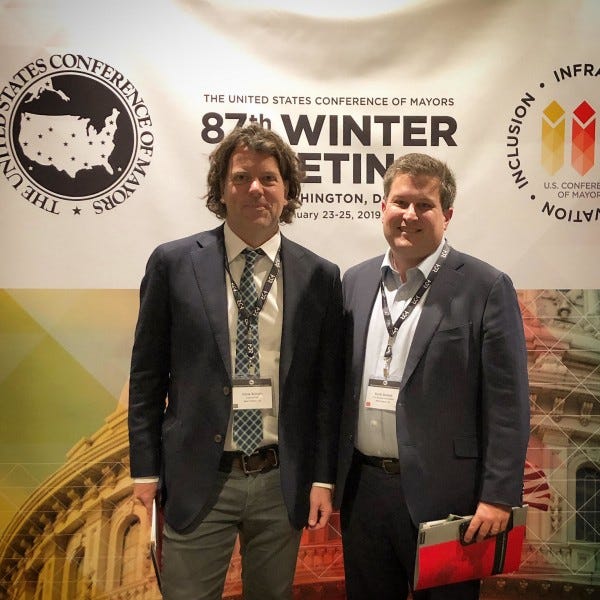Leadership is Local
Last week, I had my Mr. Schultz goes to Washington moment thanks to an invite to participate in a roundtable discussion hosted by the…

A picture from my seat at the table at the US Conference of Mayors.
Last week, I had my Mr. Schultz goes to Washington moment thanks to an invite to participate in a roundtable discussion hosted by the United States Conference of Mayors Council on Metro Economies.
Against the backdrop of the federal government shutdown (which has since ended, for now), our country’s mayors were hard at work reinforcing that the leadership we need is local.
I sat with a diverse, bipartisan group of mayors from cities across the country each focused on creating economic dynamism in their hometown.
The promise of Opportunity Zones is transcending the partisanship in our country. Meeting more than 30 mayors reinforced our vision for Launch Pad’s Opportunity Zone expansion strategy and I’m pleased to share some of the insights from my time with these city leaders.
Get ‘Shovel Ready’ on Your City’s Intention
It is important to be intentional about getting capital to communities that have been designated as Opportunity Zones (OZs). A study in 2018 by Richard Florida showed that “the five leading metros account for more than 80 percent of total venture capital investment and 85 percent of its growth over the past decade.” Mayors at the roundtable, led by Louisville Mayor Greg Fischer, chair of the Metro Economy Council, recognize the promise of OZs. They are proactively working to make sure the Opportunity Zone law creates a clear path for significant investment in real estate and operating businesses that serve these communities. It’s clear that making zones “shovel ready” to grease the skids for investment is the key for a city’s success. We heard discussion around cities appointing “OZ Czars” in their effort to be proactive about attracting investment into their OZs — the cities that are best prepared to take on OZ investment will reap the greatest benefits from the program.
Collaboration is Crucial
Traditional economic development is competitive, with government leaders fighting to offer incentives to attract job-creating businesses to their communities. I have long advocated for a rethinking of this strategy with a focus on supporting homegrown startups. The hand wringing over the Amazon HQ2 process is leading to a renewed effort to invest in growing job-creating and wealth-building businesses locally. Creating a vibrant entrepreneurial ecosystem isn’t zero-sum like winning a headquarters relocation project — it requires intentional collaboration.
In this spirit, mayors are working hand-in-hand with groups like Kresge and the Economic Innovation Group to share ideas and learn from each other. Many cities have engaged Accelerator for America to organize detailed prospectuses that will serve as investment roadmaps for investors looking at opportunities in their cities and they are sharing best practices and ideas to make their communities stronger.

Chris Schultz of Launch Pad & Scott Shalett of Medora Ventures at the USCM.
Launch Pad created the Ecosystem Summit to foster exactly this collaboration between mayors, economic developers, and entrepreneurial leaders. It’s incredibly powerful to see mayors working collaboratively and sharing best practices to leverage the potential of OZs to the benefit of all. We’ll continue to support ecosystem development through Ecosystem Summit, with the upcoming Global Startup Summit — a free virtual online conference with an entire day dedicated to Opportunity Zones.
Investment that Fuels Inclusive Growth
Mayors we have met are rightly focused on inclusive growth by helping to connect investors to the projects that benefit people who live in OZs and the surrounding communities. As Stockton, CA Mayor Michael Tubbs said on his panel,
“Capital is going to be capital. It’s up to the mayors and leaders in the community to ensure that capital doesn’t drive displacement and the investment led by Opportunity Zones benefits the people who made them zones in the first place.”
It is clear that mayors are eager to focus on jobs and economic growth as the law develops and investors begin to look for opportunities. The conversation we had focused on how mayor’s can help by (1) matching existing resources with state and local incentives; (2) leading collaboration inside a community, in the zones, and in their cities to define additional impacts they want to cause such as resilience, equity and minority participation, job growth, and also developing reporting systems for these important metrics; and (3) making sure that investments in designated Opportunity Zones expand beyond real estate to support emerging businesses and create jobs that will help sustain economies in these areas.
Catalyzing Entrepreneurial Ecosystems
People with pride. Cities with soul. The room was full of them last week. We pride ourselves on becoming part of the communities where we open Launch Pad locations. We learned early in our post-Katrina experience in New Orleans the importance of supporting an entrepreneurial and community ecosystem as a whole. Success is contagious, and when the companies working at Launch Pad succeed, we succeed and the community succeeds.
I believe the most progressive mayors will go even further and develop an economic development strategy that involves recruitment of businesses into zones that can deliver impact to the community. Place-based development led by mayors who proactively think about programming the OZ investments in their community for the outcomes they seek will best drive the intended impact of the legislation.
Speaking of which, Launch Pad is growing and we’d love to hear from mayors and cities that are seeking to catalyze their entrepreneurial ecosystem impact we can deliver. Who’s got next?
—
Chris Schultz is the cofounder and CEO of Launch Pad, a network of coworking spaces focused on activating ecosystems in momentum markets around the country. He is a first believer in hundreds of entrepreneurs and investor in startups that prove great companies can be built anywhere. Thank you to Scott Shalett for helping me to attend the US Conference of Mayors and for helping to draft this piece.




